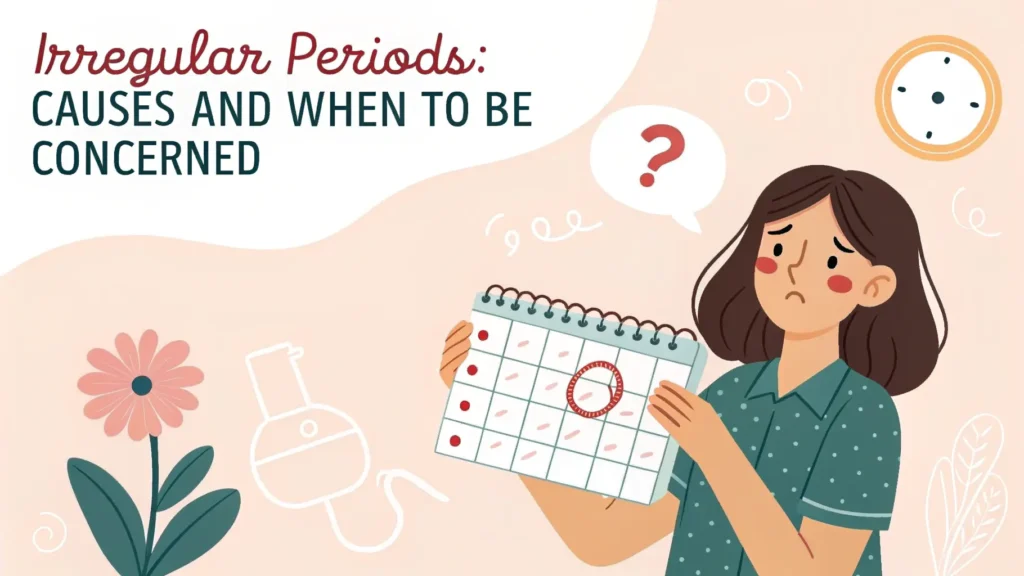It’s totally normal for your period to change a bit from month to month. But when those changes become unpredictable or extreme, it might be a sign of something deeper. 💬 Let’s explore what irregular periods really mean, what might be causing them, and when it’s time to talk to your doctor.
What Are Irregular Periods? ⏳
Irregular periods refer to menstrual cycles that significantly stray from the usual pattern. A typical menstrual cycle is 21 to 35 days long, with bleeding lasting 2 to 7 days. When your periods fall outside this range, it may be considered irregular.
Common Signs of Irregular Periods 🚩
- 🩸 Cycles shorter than 21 days
- 📅 Cycles longer than 35 days
- ❌ Missed periods for several months
- ❓ Unpredictable bleeding patterns
- 💧 Very heavy or extremely light flow
- ➖ Spotting between periods
Why Do Irregular Periods Happen? 🤔
Your menstrual cycle is mainly controlled by hormones. When there’s a hormonal imbalance, your cycle can shift or become unpredictable. Below are some of the most common causes:
Hormonal Imbalances
- Polycystic Ovary Syndrome (PCOS): One of the most common reasons. Often shows up with acne, weight gain, and unwanted hair growth. 🧬
- Thyroid Disorders: Both hypothyroidism (underactive thyroid) and hyperthyroidism (overactive thyroid) can disturb your period. 🔄
- Perimenopause: The years before menopause often involve hormonal ups and downs, leading to erratic cycles. 🕰️
Lifestyle Factors
- Stress 😰: Chronic stress can confuse your brain’s signals to the ovaries, delaying or skipping ovulation.
- Excessive Exercise 🏃♀️: Especially in athletes, intense workouts may stop ovulation altogether.
- Sudden Weight Changes ⚖️: Rapid weight gain or loss can mess with your hormones and disrupt your period.
Medications
- Hormonal Birth Control 💊: Can cause spotting or irregular cycles when starting or stopping.
- Other Medications: Such as antipsychotics or antidepressants, which may interfere with hormonal signals.
Medical Conditions
- Diabetes
- Hyperprolactinemia: High prolactin levels can stop ovulation.
- Eating Disorders
- Uterine Issues: Fibroids, polyps, or infections can trigger irregular bleeding.
🩺 Is It Serious?
Sometimes — but not always.
A few irregular cycles can be totally normal, especially if tied to stress or a lifestyle shift. But consistent irregularity could point to an underlying health issue. 🧐
When to Be Concerned? 🚨
Consult a healthcare provider if you experience:
- ❌ No period for 3+ months
- 🔁 Cycles happening more often than every 21 days
- ⏱️ Cycles stretching beyond 35 days
- 🩸 Extremely heavy bleeding
- ➕ Bleeding between periods
- 😖 Severe pain or cramps
- ⚠️ Hormonal imbalance signs (acne, hair thinning, unwanted hair growth)
Risks of Ignoring Irregular Periods ⚠️
Untreated irregular cycles can lead to:
- Infertility: Due to anovulation (no egg release)
- Anemia: From heavy, prolonged bleeding
- Bone Loss: Caused by low estrogen
- Endometrial Hyperplasia/Cancer: Especially when menstruation is rare but estrogen remains active
Diagnosis and Treatment 🔍
Your doctor may recommend:
- 🧪 Blood Tests: To check hormone levels, thyroid function
- 🖥️ Pelvic Ultrasound: To assess uterus and ovaries
- 💡 Treatment Options: Could include lifestyle changes, hormonal birth control, or other therapies depending on the cause
Takeaway
Irregular periods are often harmless — especially when caused by short-term factors like stress or diet. 🌿
But if your cycle stays irregular or disrupts your life, don’t brush it off. Your period is more than just a monthly inconvenience — it’s a vital sign of your health. 🩺
Always check in with a trusted healthcare provider if you’re unsure. 💬

